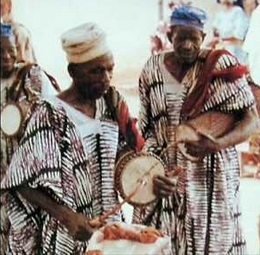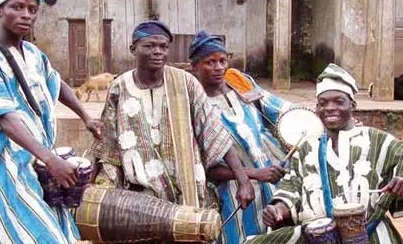
support@yorubalibrary.com
+2348073529208, 07038599574

Apala music, a traditional Yoruba genre, holds a special place in Nigerian culture. Its rich history, rhythmic complexity, and cultural relevance make it a vital part of the Yoruba musical heritage.
Origins and History
Apala music originated in the Yoruba communities of southwestern Nigeria in the early 20th century. Initially, it was performed to wake up Muslims during the Ramadan fast (known as Ajiwere), but it quickly evolved into a popular music genre enjoyed by many. The traditional instruments used in Apala music include the agidigbo (thumb piano), sekere (gourd shaker), agogo (metal gong), and various types of drums.
Key Characteristics
Apala music is characterized by its intricate rhythms, call-and-response vocal patterns, and deep, resonant percussion. The music often features slow to moderate tempos, allowing the complex rhythms and rich textures of the instruments to shine. The lyrics of Apala songs typically address social issues, historical events, and moral lessons, reflecting the daily lives and beliefs of the Yoruba people.
Prominent Apala Musicians
Several musicians have been instrumental in popularizing Apala music. Notable among them is Haruna Ishola, who is often regarded as the king of Apala music. His contributions to the genre include numerous hit songs and albums that have stood the test of time. Other prominent figures include Ayinla Omowura and Kasumu Adio, both of whom have left a lasting impact on the Apala music scene.
Cultural Significance
Apala music holds immense cultural significance for the Yoruba people and Nigeria as a whole. It serves as a medium for storytelling, preserving history, and promoting social values. The music's themes often revolve around cultural identity, communal harmony, and moral teachings, making it an important tool for education and cultural preservation.
Modern Influence and Evolution
In recent years, Apala music has influenced contemporary Nigerian music genres such as Fuji and Afrobeat. Modern musicians often incorporate elements of Apala into their songs, keeping the traditional rhythms and instruments alive in a modern context. This fusion has helped to introduce Apala music to a younger generation, ensuring its continued relevance.
Conclusion
Apala music is more than just a musical genre; it is a cultural treasure that embodies the history, values, and spirit of the Yoruba people. Its enduring popularity and influence on modern music highlight its significance and the important role it plays in Nigerian culture. As we appreciate Apala music, we also celebrate the rich heritage and traditions it represents.

The unique styles of Yoruba Bata and Dundun dances…

The emergence of new age social media and impact i…